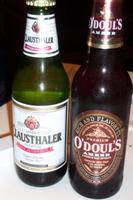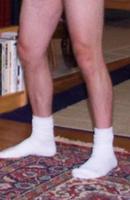
This past weekend, my wife and I were up North at my dad's cabin. It's on a smallish, weedy lake, with lots of trees, an eagles' nest, and the occasional loon. It's been hot up there, too; the corn looks sickly, and the fishing has been moribund. Nevertheless, I spent hours in the canoe, changing from live bait to lure to other lure. Pickings were slim, but I saw lots of wildlife, and got my fill of peace and quiet. It was hot up there, but the stiff breeze from the south made things tolerable, especially when we put an air conditioner in the bedroom window.
My dad bought the cabin several years ago with money he inherited. When he bought it, it wasn't finished: it didn't have running water or electrical service, and the interior walls and ceiling were bare and uninsulated. But my dad is a Dad's Dad, and has been gradually finishing the place: now there's a functioning toilet and shower, refrigerator, and various other additions that make staying at the cabin an increasingly lazy experience (yeah!).
The cabin is perched on lovely little hill overlooking the weedy little lake, and that's the main problem. It's getting to be quite a hike to get up the hill for a beer after a swim. If you repeat the trek three or four times in a day, it can be exhausting. To me, and, increasingly, to my dad.
Dad's 63. He retired last year, and he's in reasonably good shape, but over the last few years I've noticed that he and I are engaged in a similar struggle. We are both, by nature, doers. We love doing stuff, and are not very good at not doing stuff. We obsess over the stuff we think we need to do with our houses, cars, gardens, boats, and retirement funds, the vacations we want to take, the recipes we want to try, the rivers we want to fish. We revel in planning and engineering the stuff we want to do, and we love talking about how well or how poorly our half-baked ideas turn out. We are both now forced to come to grips with the fact that we can no longer do the stuff we need to do, want to do, dream about doing.
When MS started to really sap my physical stamina a few years back, my dad was still chain-sawing through trees that fell across the driveway to the cabin, bare-chested and in his sandals. In the spring and fall, my dad and my older brother put in and remove the dock, while I watch from the bulkhead. My dad has had trouble, though, with spinal stenosis (much improved since recent surgery), carpal tunnel, and the assorted aches and pains of a 60+ body. A few years ago, he actually paid somebody to cut down a tree.
When I'm at the cabin, I wonder how much longer he'll be able to enjoy the place. I wonder if he'll finish fixing up the place while he's got time to enjoy it. I wonder how much longer he'll be able to enjoy fixing the place. I wonder how much longer I'll be able to enjoy the place. I wonder how many more summers we have to sit around drinking beer and complaining about washing machines, roofs, and bodies that don't work the way they used to.







